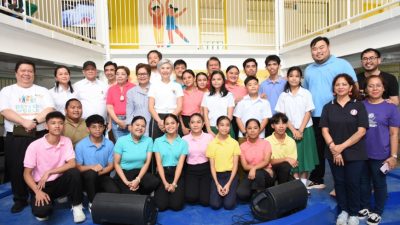File photo of Commissioner Albert Dela Cruz during coastal clean-up with the Philippine Army in Boracay in August last year. (Photo courtesy of OCADC)
MANILA — Climate Change Commissioner Albert Dela Cruz Sr. has called upon local government units (LGUs) situated near coastal areas and rivers to contribute to the conservation and proliferation of mangroves as these vital ecosystems play a crucial role in safeguarding vulnerable communities from the impact of severe flooding and other climate-related disasters he said.
The Commissioner’s appeal comes in response to findings by scientists from the University of the Philippines-Diliman College of Science, who have confirmed that the Philippines ranks as the second-worst country among the Association of Southeast Asian Nations (ASEAN) in terms of mangrove loss.
Between 1990 and 2010, research indicates that the country’s mangrove population experienced a decline of 10.5 percent. Only Myanmar surpasses the Philippines in this regard, with a significant loss of 27.6 percent.
Commissioner Dela Cruz highlights the concerning data against the backdrop of the international proclamation of the UN Decade on Ecosystem Restoration, which strives to halt and reverse ecosystem degradation globally from 2021 to 2030.
Leveraging his expertise as a knowledgeable biologist and environmental advocate, the climate official proposes that LGUs, in addition to implementing their local climate change action plans (LCCAP), should focus on introducing more diverse mangrove flora and fauna to serve as foundations for identifying and prioritizing sites for mangrove restoration.
By doing so, he emphasizes that the country can align with the UN’s biodiversity objectives and potentially gather valuable insights into local biodiversity.
Dela Cruz’s journeys across the nation have seen him participate alongside LGUs in activities aimed at restoring mangroves in coastal communities such as those in Davao del Sur, Leyte, and Cebu. These regions were severely affected by the impact of super typhoon Odette (internationally known as Rai) in 2021.
In addition to these efforts, Dela Cruz advocates for LGU policies to promote ongoing research and community engagement in mangrove monitoring. In this context, collaborative partnerships play a vital role in sustaining regional mangrove protection.
He underscores the importance of establishing and strengthening partnerships between the national government, LGUs, and private stakeholders. This approach can help formulate unified goals and facilitate sustainable restoration measures that will ultimately benefit the entire country in the long term.
In conclusion, the climate official underscores that besides their role in mitigating the effects of destructive waves, well-preserved mangrove areas can significantly contribute to the nation’s food security initiatives. By serving as breeding grounds for fish, these areas can support livelihoods and provide a source of sustenance. (ai/mnm)



